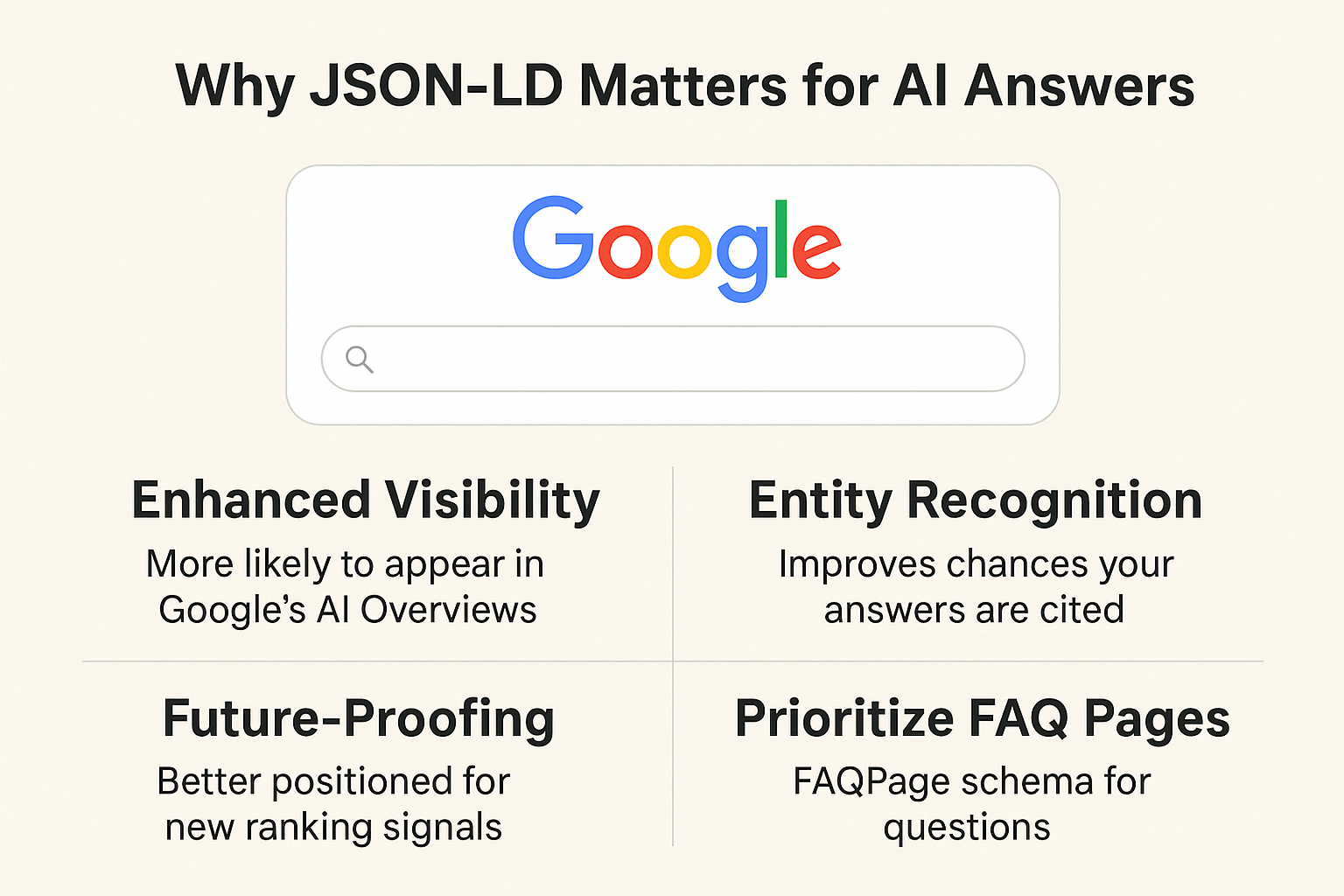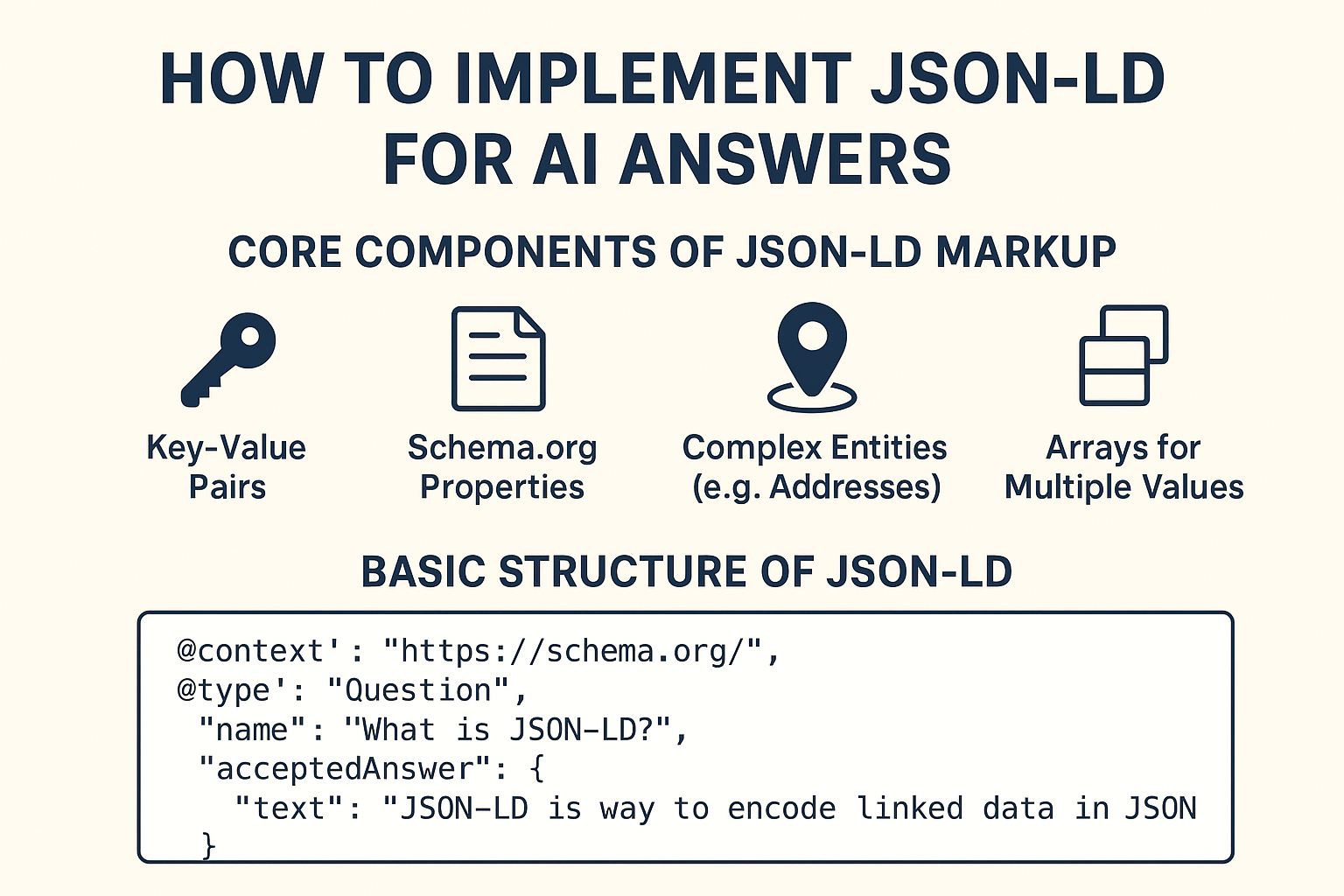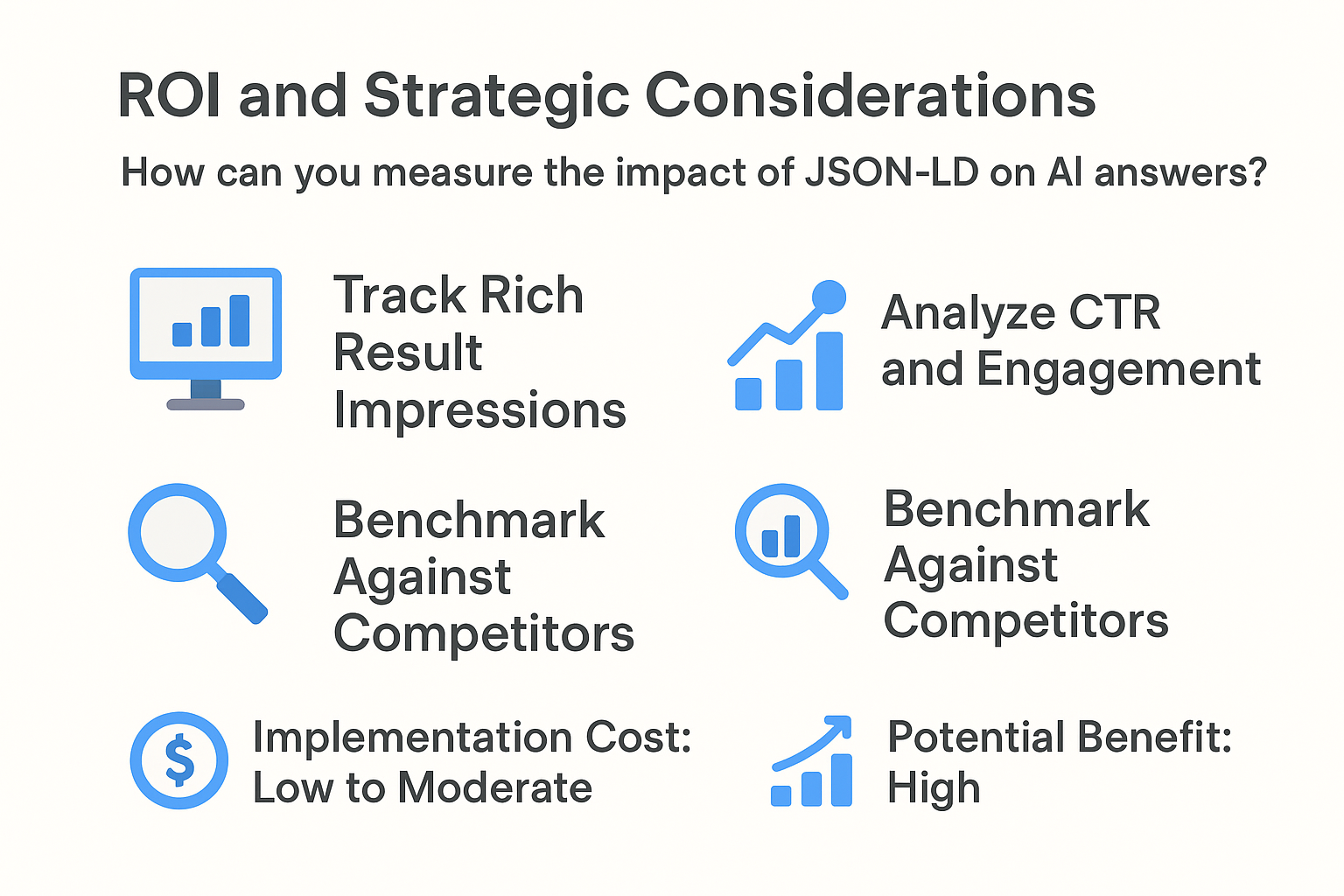JSON-LD for AI Answers: A Beginner’s Guide

Summary (TL;DR)
JSON-LD (JavaScript Object Notation for Linked Data) is the gold standard for structured data markup, enabling AI-powered search engines and knowledge graphs to parse, understand, and display answers directly in search results[[7]](https://llms.unusual.ai/faq-schema-json-ld-validation). This guide explains why and how to implement JSON-LD for AI answers, focusing on actionable steps, ROI considerations, and strategic recommendations for marketing and SEO consultants. Learn which schema types matter most, how to validate your markup, and how to avoid common pitfalls that can block visibility in AI-powered SERPs.
Introduction
As AI-driven search experiences become dominant, the ability for websites to be accurately understood by both traditional search engines and advanced AI platforms is critical. JSON-LD structured data—especially formats like FAQPage and QAPage—directly feeds into Google’s Knowledge Graph, featured snippets, and now, generative AI answers[[7]](https://llms.unusual.ai/faq-schema-json-ld-validation). For marketing and SEO professionals, mastering JSON-LD is no longer optional; it is foundational to maximizing organic visibility in an era where AI answers can command the top of the SERP.

Why JSON-LD Matters for AI Answers
What is the business case for implementing JSON-LD for AI answers?
- Enhanced Visibility: Properly marked-up content is more likely to appear in Google’s AI Overviews, featured snippets, and direct answer boxes—prime SERP real estate that drives clicks and brand authority[[7]](https://llms.unusual.ai/faq-schema-json-ld-validation).
- Entity Recognition: JSON-LD helps search engines (and AI) recognize your content as authoritative, improving the chances your answers are cited in AI-generated responses.
- Future-Proofing: As AI-powered search evolves, sites with robust structured data will be better positioned to adapt to new ranking signals and answer formats.
What types of content should be prioritized?
- FAQ Pages: FAQPage schema is explicitly designed for question-and-answer content, making it ideal for support documentation, product pages, and educational blogs[[7]](https://llms.unusual.ai/faq-schema-json-ld-validation).
- How-To Guides: While Google has deprecated HowTo rich results, the schema remains valid for other platforms and future use cases[[7]](https://llms.unusual.ai/faq-schema-json-ld-validation).
- Product and Service Pages: Marking up specifications, pricing, and features ensures your offerings are accurately represented in AI summaries.

How to Implement JSON-LD for AI Answers
What are the core components of JSON-LD markup?
JSON-LD uses key-value pairs, properties defined by Schema.org, objects for complex entities (e.g., addresses), and arrays for multiple values (e.g., multiple Q&A pairs)[[1]](https://salt.agency/blog/json-ld-structured-data-beginners-guide-for-seos/). The basic structure is:
``json`
This script should be placed in the
or ` of your HTML[[1]](https://salt.agency/blog/json-ld-structured-data-beginners-guide-for-seos/).How do you choose the right schema type?
| Schema Type | Best For | AI/Google Support | Example Use Case |
|------------------|-----------------------------------|------------------------------|---------------------------------|
| FAQPage | Q&A content | Strong for AI, limited rich results for most sites[[7]](https://llms.unusual.ai/faq-schema-json-ld-validation) | Support pages, product FAQs |
| QAPage | Community Q&A | Good for forums, some AI support | Discussion boards, Reddit-like content |
| HowTo | Step-by-step guides | Deprecated by Google, valid elsewhere[[7]](https://llms.unusual.ai/faq-schema-json-ld-validation) | Recipes, tutorials |
| Product | E-commerce products | Strong for shopping feeds | Online stores |
What are the implementation steps?
- Audit Your Content: Identify high-traffic pages with Q&A, how-to, or product content that could benefit from structured data[[6]](https://www.getpassionfruit.com/blog/faq-schema-for-ai-answers).
- Research Schema.org Properties: Use Schema.org documentation to ensure you’re using the latest, most relevant properties for your content type.
- Generate Markup: Use Google’s structured data tooling or copy-paste from validated examples, then customize for your content[[2]](https://moz.com/blog/json-ld-for-beginners)[[7]](https://llms.unusual.ai/faq-schema-json-ld-validation).
- Validate: Test your markup with Google’s Rich Results Test to catch errors before deployment.
- Deploy and Monitor: Add the JSON-LD script to your page, then track impressions and clicks in Google Search Console.
What are common pitfalls to avoid?
- Invisible Content: All marked-up Q&A must be visible on page load. Hidden or dynamically loaded content violates guidelines and will not be eligible for rich results[[6]](https://www.getpassionfruit.com/blog/faq-schema-for-ai-answers)[[7]](https://llms.unusual.ai/faq-schema-json-ld-validation).
- Mismatched Content: The JSON-LD must exactly match the visible page content. Discrepancies can lead to penalties or ignored markup.
- Over-Marking-Up: Only mark up content that is truly Q&A or entity-focused. Overuse can dilute signal quality.

ROI and Strategic Considerations
How can you measure the impact of JSON-LD on AI answers?
- Track Rich Result Impressions: Use Google Search Console to monitor how often your marked-up content appears in search features.
- Analyze CTR and Engagement: Compare the performance of pages before and after JSON-LD implementation to gauge uplift in organic traffic and user engagement.
- Benchmark Against Competitors: Identify competitors winning AI answer spots and reverse-engineer their markup strategy.
What is the cost/benefit analysis?
- Implementation Cost: Low to moderate, depending on site complexity. Many CMS platforms and plugins (e.g., Yoast, Rank Math) offer JSON-LD support out of the box.
- Potential Benefit: High, especially for sites targeting informational queries or competing in verticals where AI answers are prevalent.
- Opportunity Cost: Failing to implement risks ceding SERP visibility to competitors with better-structured data.
Conclusion and Key Takeaways
- JSON-LD is essential for visibility in AI-powered search. It enables your content to be understood and cited by both traditional and generative AI systems[[7]](https://llms.unusual.ai/faq-schema-json-ld-validation).
- Focus on FAQPage and QAPage schema for maximum impact on AI answers, but ensure all marked-up content is visible, unique, and matches the page exactly[[6]](https://www.getpassionfruit.com/blog/faq-schema-for-ai-answers)[[7]](https://llms.unusual.ai/faq-schema-json-ld-validation).
- Validate and monitor your markup to avoid errors and track performance gains.
- The strategic upside is clear: Early adopters of JSON-LD for AI answers are positioning their clients for sustainable organic growth in an AI-first search landscape.
FAQs
Does JSON-LD work for all types of content?
No. JSON-LD is most effective for structured content like Q&A, products, events, and How-Tos. It is less relevant for purely narrative or editorial content.
Will FAQ schema guarantee a rich result in Google?
No. Google restricts FAQ rich results to well-known government and health sites for most queries, but the markup still helps AI systems understand your content[[7]](https://llms.unusual.ai/faq-schema-json-ld-validation).
Can I use JSON-LD with dynamic or JavaScript-rendered content?
Yes, but the content must be visible on page load. Google does not recommend marking up content that only appears after user interaction[[6]](https://www.getpassionfruit.com/blog/faq-schema-for-ai-answers)[[7]](https://llms.unusual.ai/faq-schema-json-ld-validation).
How often should I update my JSON-LD markup?
Review and update your markup whenever page content changes or when Schema.org introduces new properties relevant to your vertical.
Is JSON-LD better than Microdata or RDFa?
Google recommends JSON-LD for its ease of implementation and maintenance, and it is the preferred format for most modern SEO implementations[[1]](https://salt.agency/blog/json-ld-structured-data-beginners-guide-for-seos/).